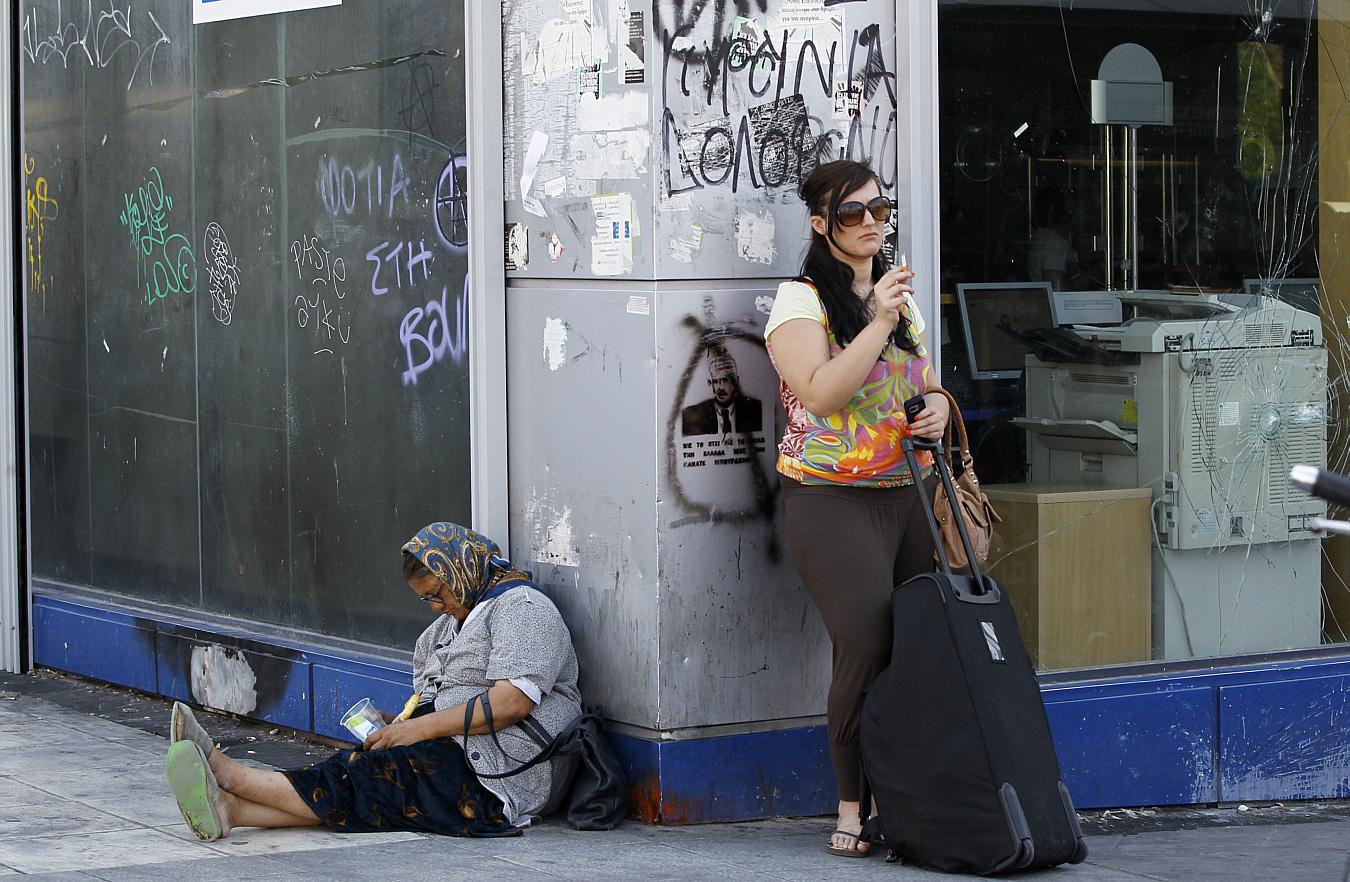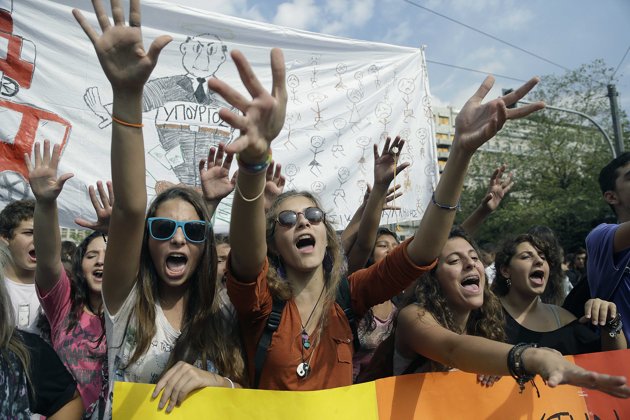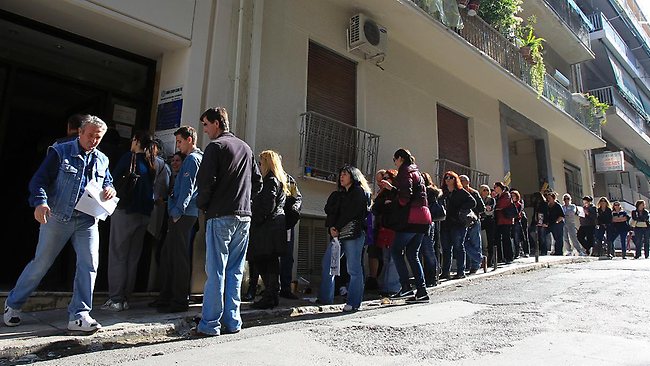Never before in Greece, have we lived and worked under the conditions that now exist in this country. Living and trying to meet obligations has been a challenge for single parent families as well as working couples. With reference to OECD findings, Greeks have the highest work rates in the EU working at 2,109 hours a year, while the OECD average is 1,749 perannum. The balance between work and living have drastically deteriorated, according to the finding of the Regus Survey with “74% of the employees are forced to work more hours than in 2010, while workers living in other counties work on average 59% more than the previous year due to the crisis.” This is eveident due to the fact the fear of being unemployed is far greater in the crisis that it ever was. Being underemployed leaves one to hope that they will be paid eventually, but never on time to meet obligations. However, being unemployed would lead to despair.
The above mentioned findings, contradict the allegations of Greeks ‘on the whole are lazy’ as they had been described in German -Press. Sure, the alligation of ‘lazy Greeks’ was referred to those in the Public sector in the past, where a whole mechanism was established by political bodies to maintain power in previous governments, while EU programs were issued with funding. Instead of instigating development and investment, governments in the past chose to waste that money or line their pockets with it, at the expense of the people of this Nation. Reforms, have been applied in reducing government expenditure and administration. As a result since 2013 many have been made redundant and were forced to retire with a pention, while others sought employment in the Private sectoror or were forced to join the line of unemployed. As for the existing Public sector , many have now resorted to following educational programs of retraining or updating their credentials. In contrast to the Private sector, working couples and single parent families under such conditions, have had a negative affect in the psychology of the Greek people , as well as in their personal lives. Women are ‘hard hit’ because they not only work to maintain a house hold and the family, but they also work long hours trying to provide for the family or to contribute to obligations and expenses.

The past 5 years from 2009 – 2014 working conditions have worsened say 92% of Greeks, while 8% believe that they have remained the same, according to Eurobarometer data. The working conditions that existed in the recent past -are no longer part of our lives. What people experience nowadays, is far different to what they were used to. It can be said that the working conditions for the Public sector in Transport, Medical staff, Defense forces and in Administration has experienced 20% to 40% reduction in their wages, as well as a change in practices, which are welcomed in some fields. The hours of work have changed to over 42 hours a week for a worker in Greece compared to the average European who works 40.3 hours a week , according to EUROSTAT reports.
As for the Private sector, according to E-Net English Eleftherotypia newspaper July 18, 2014, in an article: “Greek workers are the Unhappiest in the EU with working conditions.” The Greek Reporter further enhances this information by stating that “working conditions for hundreds of thousands of workers in Greece can be characterised as unprecedented and resemble those that exist in medieval ages.” It can not be concieved by many that there are people who work for two meals a day, call it slavery! On the other hand, companies and hundreds of businesses have adoped practices such as paying part of a salary instead of the whole salary by the end of the month. Many employees have reached the stage of not receiving salaries for months-on-end (3-6 months). Employers have also chosen to pay small parts and in time forgetting to pay the rest, leaving the employee to either ‘put up with these conditions’ or resort to legal action that would take time and money that does not exist. According to the GSEE (the General Confederation of Greek Workers Union) “Many companies are delaying payments for 6 months or even 12 months, while employees continue to work for 8 hours . At the same time, thousands of employees are illegally not receiving their benefits or holiday pay…it is estimated that more than 1 million employees work under these conditions.”

It is also important to mention the young people in the work force here in Greece. Contracts for half yearly part-time employment are issued for 25 year-olds for the pay of 180 euros a month, which is estimated for an employee to be working for 2.25 euros per day that is below the hourly wage. Greek Reporter 17th June 2014 :”Indictive of the situation in Greece is that out of the 423 thousand employment announcements per year, 140 thousand are for part -time contracts.” These conditions alone have urged many young people to immigrate seeking employment else where. Once again, the Greek reporter in an article published 1st July 2014, indicates that the European Commission for employment and social affairs has stated that “One out of every hundred employed or unemployed Greeks has submitted a CV in the online platform of the European public employment service, EURES. ” CV’s from Greeks amount to 43,000 ut of 5,117,588 recorded have been submitted seeking employment and better woking conditions.
In contrast to these surveys , the IMF Survey Magazine in an article last year on 5th June 2013 said that “Greece has made substantial progress in strengthening its fiscal position and increasing its competativeness, but still needs to plough on with structural reforms to boost growth and generate jobs, say the IMF’s mission chief for Greece-Mr. Paul Thomsen.” Further more, the government has ‘turned a blind eye’to these conditions instead, has focused on meeting the requirements of the IMF and TROIKA and implimenting austerity measures forced upon a nation all these years, while expecting ‘the living dead’ to survive this crisis.

Walking away from everything that has been read and cycling down town and in the suburbs of Athens, people feel that the Governments are the instigators of these traumatic measures. Anger is also felt towards TROIKA and the IMF who has people feeling that German economic policy through the banking system has succeeded in using the government in gaining more than what they would have gained if employment existed. The 6 thousand that have taken their lives were a mark of the humiliation felt while trying to meet obligations and working without seeing any results. The period of shock had people turn to eachother to maintain communication and to see what could be done. Many at Municipal Councils have expressed the situation of things in the neighbourhoods and have started up soup kitchens, festivals, and community work in organising stalls for clothes and food. Medical centers have been operating trying to provide medical care for those that are not insured nor have social benefits. As a final result of these conditions here in Greece many small groups have started up working together in small offices and on the land producing and providing.
Poem: The A.D years in the Dream…as seen.
by Debbie Papadakis.
The wheels turn ‘n’ glide,
In the streets as I ride.
Feeling pictures that are seen,
Raising ‘n’ raging the conscience, a scene not serine.
“WAKE-UP!” shouted under bridges and on the walls,
On buildings that are so cold.
Up loaded graffiti glares,
At tight-lipped faces that are not there.
The living-dead have come a-live,
As they take each blow in their every stride.
Austerity masked with laws called “civil” as-can-be,
As hearts pound , the body-bleeds.
Faces, eyes- that do not beg,
Work, WORK, work, with a hanging head.
Time trickles like in an hour-glass, day-in day-out,
With not much at-all to account.
They sell what they can,
Clenching on-to the coins in their hand.
The young smile, as they glare,
To a future with dispair.
Clenching, learning…working on a dream,
For a future with dignity, not-foreseen.
“Carnival -Characters” on band-wagon-floats,
Waving in the air, out to get those votes.
For-those-crosses on those ballots to be seen,
They need to change past-practices ‘n’policies.
They need not feed the ‘Greed-machine’ any more,
As they have done all these years before.
As the walls on cold buildings say:
“Politicians have sold-out to Banksters” in every-way!
Creating a chopping-cutting-machine,
Limiting growth of living the dream.
The viewpoints expressed in this article are solely those of the author and do not necessarily reflect those of the editors and publishers of Proto Thema. If you would like to contribute to our site and run your personal story on this issue or any other, please e-mail us on themanews.com@gmail.com